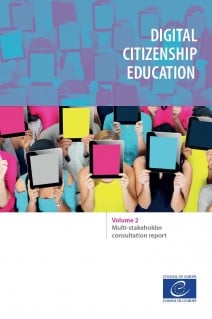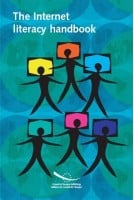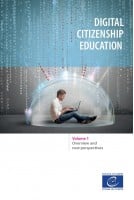



An analysis of good practices, research findings, lessons learned and resources identified across Europe in the area of digital citizenship: empowerment of children through education
Most young people in Europe today were born and have grown up in the digital era. Education authorities have the duty to ensure that these digital citizens are fully aware of the norms of appropriate behaviour when using constantly evolving technology and participating in digital life.
Despite worldwide efforts to address such issues, there is a clear need for education authorities to take the lead on digital citizenship education and integrate it into school curricula. In 2016, the Education Department of the Council of Europe began work to develop new policy orientations and strategies to help educators face these new challenges and to empower young people by helping them to acquire the competences they need to participate actively and responsibly in digital society.
This second volume in the Digital Citizenship Education series contains the results of a multi-stakeholder consultation to identify good practices regarding digital citizenship education and the gaps and challenges to be met in formal and informal learning contexts. It examines the role the development of digital citizenship competence plays in education, considers the types of online resources and contemporary information technologies used in educational settings, and details the administrative and legal responsibilities for school leaders, teachers, students and parents.
FOREWORD
EXECUTIVE SUMMARY
INTRODUCTION
PART I – METHODOLOGY AND PARAMETERS
The methodology of the project
Defining the survey parameters
PART II – SURVEY RESULTS
Findings from the Good Practice Survey – The stakeholders
Findings from the Good Practice Survey – Project focus
Findings from the Good Practice Survey – From obstacles to good practice
Findings from the Competence Grid Survey
Findings from the Competence Grid Survey – Searching for competence clusters
Innovative tools and practices which promote development of digital citizenship competences
PART III – CHALLENGES AND RECOMMENDATIONS
Consultation challenges
Recommendations
Conclusion
APPENDIX A – GOOD PRACTICE SURVEY – DIGITAL CITIZENSHIP
APPENDIX B – COMPETENCE SURVEY FORM
APPENDIX C – WHAT IS DIGITAL CITIZENSHIP?
APPENDIX D – DIGITAL DOMAINS EXERCISE
APPENDIX E – RESPONDENTS TO THE DIGITAL CITIZENSHIP SURVEY
APPENDIX F – UNESCO, GLOBAL CITIZENSHIP EDUCATION DOMAINS OF LEARNING
APPENDIX G – RESPONSE GRID: COMPETENCE SURVEY
APPENDIX H – KIDZANIA PORTUGAL – REPORT
1. Introduction
2. KidZania
3. Final notes
Download an extract (1000)







An analysis of good practices, research findings, lessons learned and resources identified across Europe in the area of digital citizenship: empowerment of children through education
Most young people in Europe today were born and have grown up in the digital era. Education authorities have the duty to ensure that these digital citizens are fully aware of the norms of appropriate behaviour when using constantly evolving technology and participating in digital life.
Despite worldwide efforts to address such issues, there is a clear need for education authorities to take the lead on digital citizenship education and integrate it into school curricula. In 2016, the Education Department of the Council of Europe began work to develop new policy orientations and strategies to help educators face these new challenges and to empower young people by helping them to acquire the competences they need to participate actively and responsibly in digital society.
This second volume in the Digital Citizenship Education series contains the results of a multi-stakeholder consultation to identify good practices regarding digital citizenship education and the gaps and challenges to be met in formal and informal learning contexts. It examines the role the development of digital citizenship competence plays in education, considers the types of online resources and contemporary information technologies used in educational settings, and details the administrative and legal responsibilities for school leaders, teachers, students and parents.
Please note that in accordance with our terms & conditions, PDF/epubs may only be purchased by private individuals.
